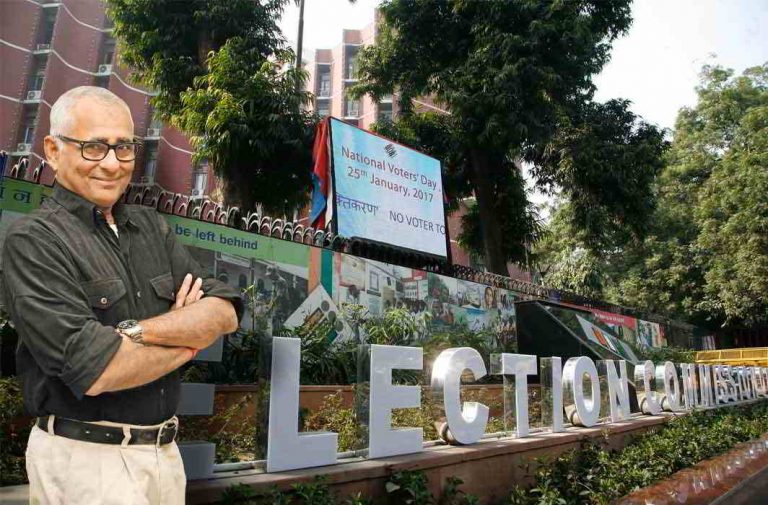
~By Inderjit Badhwar
Following the BJP’s stunning electoral victory in Uttar Pradesh, several politicians and public figures have raised the issue of rigged electronic voting machines (EVMs) and manipulation of postal ballots. Critics argue that when suspicions arose, the Election Commission (EC) could have intervened, failing which, aggrieved candidates could have approached the courts for redress.
There are endlessly confusing arguments about the powers, or lack of them, of the EC. Without getting into the merits or demerits of these accusations, one thing is abundantly clear. The law, as interpreted by the Supreme Court, clearly lays out that the EC has colossal discretionary powers—which it must use in the interests of preserving democracy—to postpone and reschedule election and order re-polls. But it has to see the electoral process to its conclusion and announce the results thereafter. Candidates with grievances of any sort can resort to only one remedy available to them—filing an election petition after the process is complete. Even the high courts should be wary of entertaining appeals mid-way notwithstanding how compelling their arguments are.
These principles were laid down in an exceptional Supreme Court judgment penned in 1978 by the venerable Krishna Iyer in a bench comprising Justices M Hameedullah Beg, PN Bhagwati, PK Goswami and PN Shingal (Mohinder Singh Gill vs Chief Election Commissioner).
On March 22, 1977, the Chief Election Commissioner received a wireless message from the Returning Officer of Punjab’s Ferozepur parliamentary constituency: “Mob about sixteen thousand by over powering the police attacked the counting hall where postal ballot papers were being counted. Police could not control the mob being out numbered. Part of postal ballot papers excepting partly rejected ballot papers and other election material destroyed by the mob.”
The CEC ruled “… as a consequence it is not possible to complete the counting of the votes in the constituency and the declaration of the result cannot be made with any degree of certainty.” Even as the EC was mulling a repoll and recount, Gill approached the CEC to revoke the order and to declare the result of the election, but without success. He then appealed to the High Court arguing that the EC had no jurisdiction to order a re-poll of the entire parliamentary constituency; the order was violative of the principles of natural justice as no opportunity of a hearing was afforded to the appellant before passing the order.
The matter was ultimately referred to the Constitution Bench of the Supreme Court, which said in a final ruling: “We are clearly of opinion that the Election Commission is competent in an appropriate case to order repoll of an entire constituency where necessary. It will be an exercise of power within the ambit of its functions under Article 324. The submission that there is complete lack of power to make the impugned order under Article 324 is devoid of substance. Such an order, relating, as it does, to election within the width of the expression as interpreted by this Court, cannot be questioned except by an election petition under the Act.”
The law, as interpreted by the Supreme Court, clearly lays out that the EC has colossal discretionary powers—which it must use in the interests of preserving democracy—to postpone and reschedule election and order re-polls. But it has to see the electoral process to its conclusion and announce the results thereafter.
In this observation, the Court reiterated the famous N.P. Ponnuswami v. Returning Officer, Nanmakkal Constituency & Ors. 1952 case: “The Representation of the People Act provides for only one remedy, that remedy being by an election petition to be presented after the election is over, and there is no remedy provided at any intermediate stage.”
“The super-authority,” said the Supreme Court in the Gill judgment, “is the Election Commission, the kingpin is the returning officer, the minions are the presiding officers in the polling stations and the electoral engineering is in conformity with the elaborate legislative provisions.”
Further: “If the grounds on which an election can be called in question could be raised at an earlier stage and efforts, if any, are rectified, there will be no meaning in enacting a provision like article 329 (b) and in setting up a special tribunal. Any other meaning ascribed to the words used in the article would lead to anomalies, which the Constitution could not have contemplated, one of them being that conflicting views may be expressed by the High Court at the pre-polling stage and by the election tribunal, which is to be an independent body, at the stage when the matter is brought up before it.”
The Court, in reminding us all that constitutional and statutory remedies exist and must be pursued, made a telling observation: “The pregnant problem of power and its responsible exercise is one of the perennial riddles of many a modern constitutional order. Similarly, the periodical process of free and fair elections uninfluenced by the caprice, cowardices or partisanship of hierarchical authority holding it and unintimidated by the threat, tantrum or vandalism of strong-arm tactics, exacts the embarrassing price of vigilant monitoring. Democracy digs its grave where passions, tensions and violence, on an overpowering spree, upset results of peaceful polls, and the law of elections is guilty of sharp practice if it hastens to legitimize the fruits of lawlessness. The judicial branch has a sensitive responsibility here to call to order lawless behaviour. Forensic non-action may boomerang, for the court and the law are functionally the bodyguards of the People against bumptious power, official or other.”
—Inderjit Badhwar is Editor-in-Chief, India Legal.
He can be reached editor@indialegallive.com

